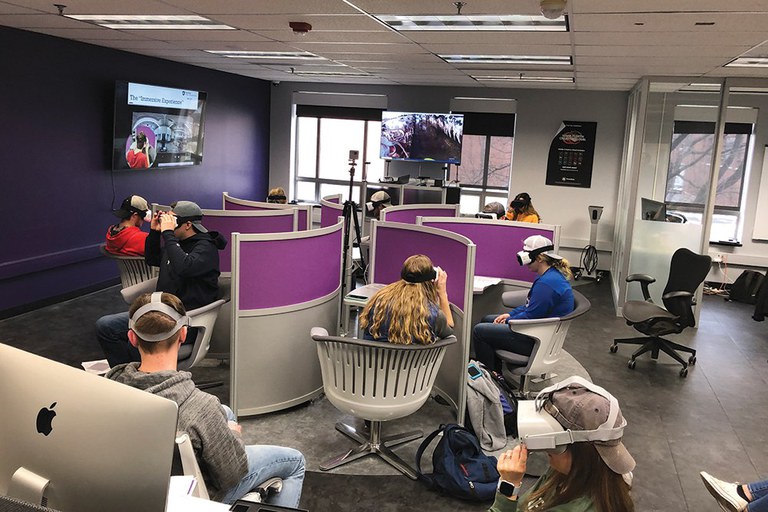Posted: March 30, 2023
Technology transports us. No longer bound by the four walls of a classroom, professors in the College of Agricultural Sciences are utilizing cutting-edge technology -- from immersive course content to international collaboration -- to prepare the next generation of agricultural leaders.
On-the-farm experiences help students understand management practices related to animal health in common animal operations such as dairy, sheep and cattle, noted Adrian Barragan, extension veterinarian and assistant research professor of veterinary and biomedical sciences.
In 2020, Barragan was exploring options to incorporate farm visits into his course on ruminant herd health management that would accommodate students' class schedules and overcome some of the economic burdens of this hands-on teaching format. Along with these usual logistical hurdles, the COVID-19 pandemic was shutting down the world. Could virtual reality fill the gap?
For support, Barragan turned to Jaime García Prudencio, assistant teaching professor in the Spanish for Agriculture program. Using GoPro cameras, Barragan and García Prudencio recorded 360-degree videos in the animal-housing areas of Penn State facilities and local farms.
Watching the videos with virtual reality headsets, students could walk around the farms as if they were there -- assessing common farm practices related to feed availability, animal-nutritional status and pen management.
"This was a great first step to give them that initial exposure to a farm," Barragan said.
The 360-degree videos caught the attention of Justin Brown, assistant teaching professor in veterinary and biomedical sciences, who imagined the possibilities for animal anatomy and wildlife education.
The technology can be challenging. To sharpen their skills, Brown, Barragan and García Prudencio secured a Penn State Teaching and Learning with Technology fellowship. This gave them access to experts such as Dan Getz, immersive experiences consultant.
The professors then developed a series of immersive videos for Brown's comparative vertebrate anatomy course. Videos included a necropsy of a deer and the process of capturing an elk to track health and performance. They recently received a 2021-2022 Innovative Teaching Award from the Association of Public and Land-grant Universities and will apply the funds toward additional equipment and developing extension educational materials to train dairy farm personnel on milking practices.
Preparing global citizens
"How are we preparing our students to be global citizens?" This question drives the work of Melanie Miller Foster, associate teaching professor of international agriculture.
While study abroad contributes to global learning, not everyone can access those types of experiences, Miller Foster pointed out. "Only 20% or so of our students study abroad as undergraduates for many different reasons," she said.
When the pandemic hit, Miller Foster saw an opportunity for technology to create more equitable global learning experiences. She developed an online, asynchronous class focused on food security and invited students from around the world to participate.
Using the free platform Flip, students recorded and shared videos on course topics. "Flip is helpful for nonnative English speakers because it creates auto captions," Miller Foster said. Behind the scenes, she observed the number of views soar.
With students from Ukraine, Malaysia, the U.S. and Mexico, the diversity of perspectives sparked deep conversations around food security.
"They endlessly discussed how a 'rich' country like the United States can have food insecurity," said Miller Foster. "It's fascinating. Before the war in Ukraine, there was a lower rate of food insecurity in Ukraine than in the U.S."
Empowering educators to address food security and other global issues was a driving force behind the Global Teach Ag Network, co-founded in 2014 by Miller Foster and Daniel Foster, associate professor of agricultural and extension education.
"We now have 1,200 educators from 46 countries and all 50 U.S. states who engage in this space," Foster said. "It provides the opportunity to share best practices in the areas of agriculture and food security."
Penn State's Teaching and Learning with Technology team provided crucial assistance for these educational and outreach initiatives, Foster noted. "As we explored immersive technologies and digital communities of practice, they have been a vital collaborator and partner."
--Alexandra McLaughlin
Features
Fostering Forests
Across the United States, forests face unprecedented threats, and scientists in Penn State's College of Agricultural Sciences are conducting novel and complex research to conserve them.
Buzzing With Purpose
Community scientists work to protect Pennsylvania's wild bees
Conservation Reimagined
Exploring new approaches to cope with a changing climate



